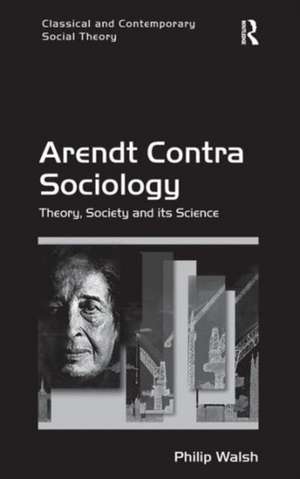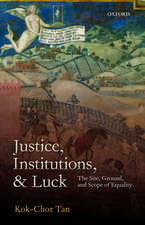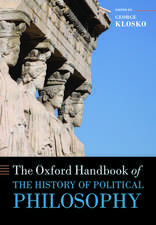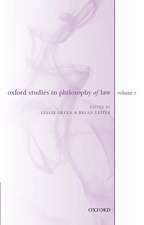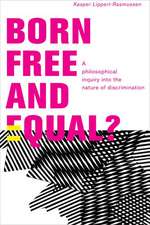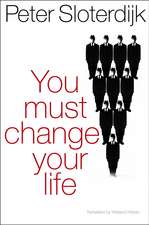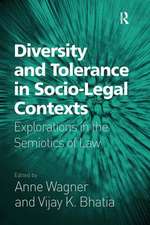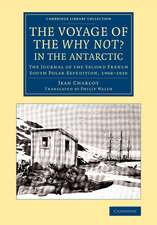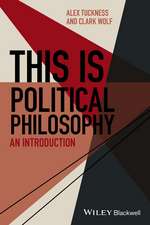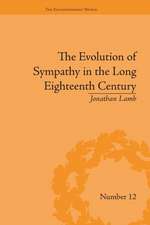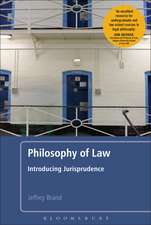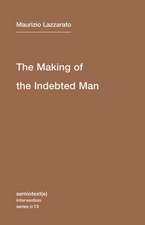Arendt Contra Sociology: Theory, Society and its Science
Autor Philip Walshen Limba Engleză Hardback – 10 feb 2015
| Toate formatele și edițiile | Preț | Express |
|---|---|---|
| Paperback (1) | 469.34 lei 6-8 săpt. | |
| Taylor & Francis – 27 ian 2017 | 469.34 lei 6-8 săpt. | |
| Hardback (1) | 1001.07 lei 6-8 săpt. | |
| Taylor & Francis – 10 feb 2015 | 1001.07 lei 6-8 săpt. |
Preț: 1001.07 lei
Preț vechi: 1220.81 lei
-18% Nou
Puncte Express: 1502
Preț estimativ în valută:
191.57€ • 198.87$ • 159.74£
191.57€ • 198.87$ • 159.74£
Carte tipărită la comandă
Livrare economică 22 martie-05 aprilie
Preluare comenzi: 021 569.72.76
Specificații
ISBN-13: 9781409438632
ISBN-10: 1409438635
Pagini: 174
Dimensiuni: 156 x 234 x 11 mm
Greutate: 0.48 kg
Ediția:1
Editura: Taylor & Francis
Colecția Routledge
Locul publicării:Oxford, United Kingdom
ISBN-10: 1409438635
Pagini: 174
Dimensiuni: 156 x 234 x 11 mm
Greutate: 0.48 kg
Ediția:1
Editura: Taylor & Francis
Colecția Routledge
Locul publicării:Oxford, United Kingdom
Notă biografică
Philip Walsh is Associate Professor of Sociology at York University, Canada. He is the author of Skepticism, Modernity and Critical Theory and co-editor of Retaking the Universe: William S. Burroughs in an Age of Globalization.
Cuprins
Chapter 1 Introduction; Part 1 Society and its Science; Chapter 2 Society; Chapter 3 Sociology; Part 2 Re-thinking Sociological Theory; Chapter 4 Reflexivity; Chapter 5 Power; Chapter 6 Knowledge; Chapter 7 Consumption; Chapter 8 Conclusion: The Good Society and the Future of Sociology;
Recenzii
'This probing, ambitious and lucid book is the first major attempt to connect Hannah Arendt's work to contemporary sociology. It succeeds brilliantly and will be a vital source for all who wish to engage with Arendt's challenge to sociology and to the social sciences more generally.'
Peter Baehr, Lingnan University, Hong Kong
'Philip Walsh has accomplished something remarkable in this book. He has combined a contextual history of Arendt’s problematic relations to sociology, a deep reflection on some of the central themes of recent sociological thought, and an explication of her complex scheme of surrogates for more traditional social theoretical concepts.'
Stephen Turner, University of South Florida, USA
'This is an important and accessible book that critically mediates debates in contemporary sociology in light of Hannah Arendt's work. Addressed primarily to sociologists, it successfully moves beyond Arendt's critique of sociology to show the way her insights can provide a significant and much needed corrective to the discipline's current state of theoretical pluralism. The book's great accomplishment is the way it uses Arendt's formulations to examine the conceptual strengths and deficiencies of theorists from Marx, Weber, Simmel, Mead and Mannheim, to Goffman, Giddens, Bourdieu, Baumann, Marcuse, Habermas, Archer and Lukes.'
Kieran Bonner, St. Jerome's University at the University of Waterloo, Canada [Translated from French]
'Rich in detail and explanation but still very clear, Walsh’s book performs the painstaking work of constructing the thought of Arendt (or even re-constructing when it comes to the question of knowledge) to engage or re-engage and question the concepts themselves away from the subject as a whole, in a complete perspective of the discipline which thus allows the thinking on not only the proliferation of theoretical paradigms and concepts (p. 3). Since this is the explicit objective of the book, it appears not only to have fulfilled its goal, but to have opened the door to resolutely heuristic discussion that has perhaps become too rare.'
Lectures, an International Journal of Reviews in Social Sciences
'He gives a survey of her triadic understanding of human activity, which she divides into labor, work, and action. Walsh underlines that Arendt does not suggest a classifying typology in the manner of Weber, but that she rather
defines these categories as ontological, that is, as basic aspects of human existence.'
Tomas Stølen, Acta Sociologica
Peter Baehr, Lingnan University, Hong Kong
'Philip Walsh has accomplished something remarkable in this book. He has combined a contextual history of Arendt’s problematic relations to sociology, a deep reflection on some of the central themes of recent sociological thought, and an explication of her complex scheme of surrogates for more traditional social theoretical concepts.'
Stephen Turner, University of South Florida, USA
'This is an important and accessible book that critically mediates debates in contemporary sociology in light of Hannah Arendt's work. Addressed primarily to sociologists, it successfully moves beyond Arendt's critique of sociology to show the way her insights can provide a significant and much needed corrective to the discipline's current state of theoretical pluralism. The book's great accomplishment is the way it uses Arendt's formulations to examine the conceptual strengths and deficiencies of theorists from Marx, Weber, Simmel, Mead and Mannheim, to Goffman, Giddens, Bourdieu, Baumann, Marcuse, Habermas, Archer and Lukes.'
Kieran Bonner, St. Jerome's University at the University of Waterloo, Canada [Translated from French]
'Rich in detail and explanation but still very clear, Walsh’s book performs the painstaking work of constructing the thought of Arendt (or even re-constructing when it comes to the question of knowledge) to engage or re-engage and question the concepts themselves away from the subject as a whole, in a complete perspective of the discipline which thus allows the thinking on not only the proliferation of theoretical paradigms and concepts (p. 3). Since this is the explicit objective of the book, it appears not only to have fulfilled its goal, but to have opened the door to resolutely heuristic discussion that has perhaps become too rare.'
Lectures, an International Journal of Reviews in Social Sciences
'He gives a survey of her triadic understanding of human activity, which she divides into labor, work, and action. Walsh underlines that Arendt does not suggest a classifying typology in the manner of Weber, but that she rather
defines these categories as ontological, that is, as basic aspects of human existence.'
Tomas Stølen, Acta Sociologica
Descriere
Arendt Contra Sociology re-assesses the relationship between Hannah Arendt's work and the theoretical foundations of sociology, bringing her insights to bear on key themes within contemporary theoretical sociology. Departing from the view of Arendt as a political theorist who sought to rescue politics from society, and political theory from the social sciences, this book re-examines her distinctions between labor, fabrication and action as a theory of the fundamental ontology of human societies, revisiting her criticism of the tendency of many sociological paradigms to conflate the activity of fabrication with that of action.
